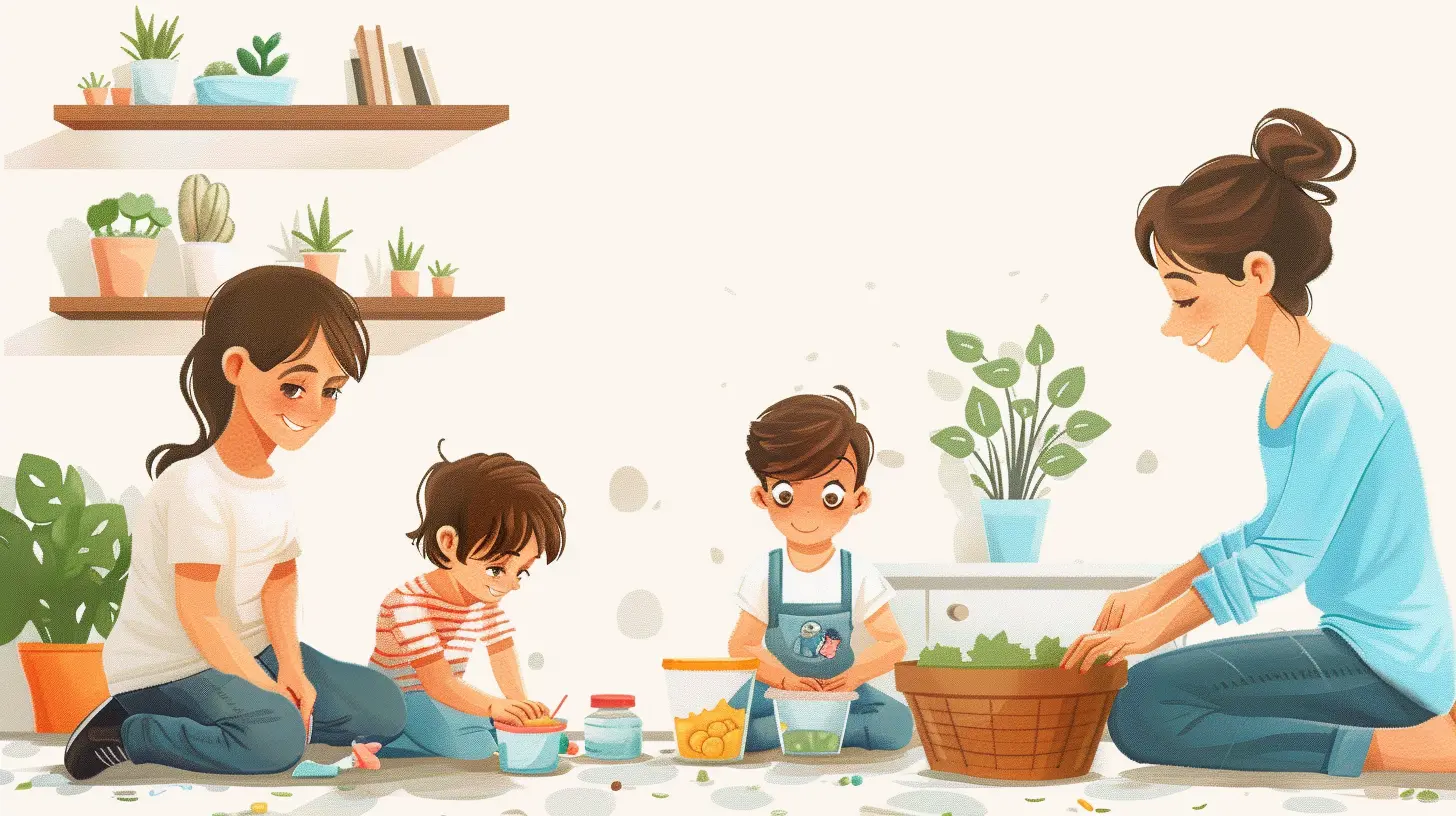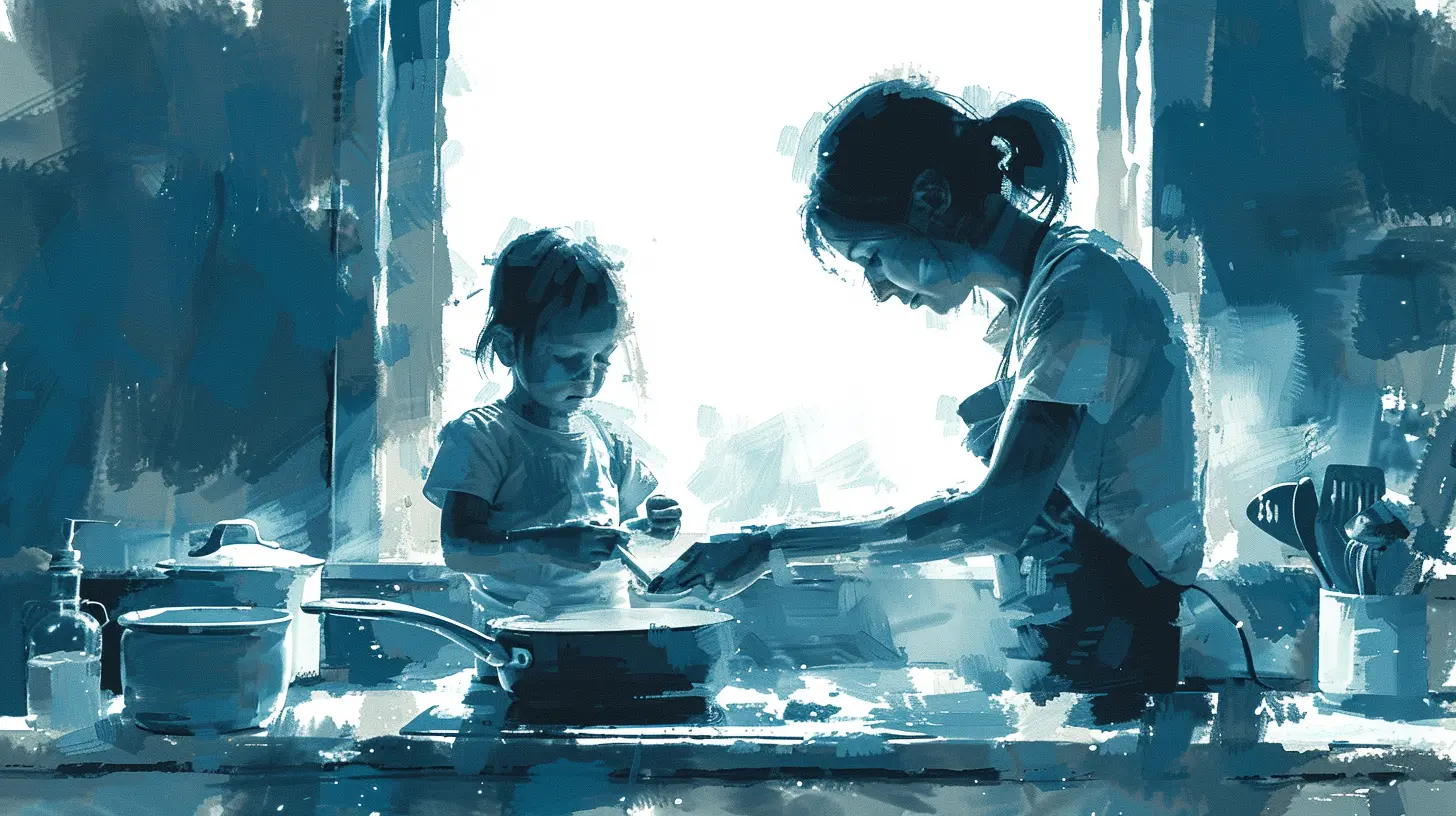The Benefits of Teaching Kids to Help Around the House
24 October 2025
Let’s face it—parenting is a full-time job with zero coffee breaks and a laundry list of responsibilities that never seems to end (literally). Between school runs, work, meals, and the occasional toddler meltdown, it's easy to feel like you're doing everything on your own. But what if I told you there's a secret weapon that could help lighten the load while also making your kids more responsible?
Yep, that’s right. Getting your kids involved in household chores isn't just about lightening your to-do list—it's about teaching them life skills that will benefit them (and you) for years to come.
In this post, we’ll dive into the many benefits of teaching kids to help around the house. From building confidence to embracing responsibility, there's so much more to chores than just folding laundry and setting the table.
Why Should Kids Help at Home?
Have you ever heard your child say, “But that’s not my mess!” or the classic, “I’ll do it later”? Cue the deep sigh.Truth is, when you encourage your children to lend a hand at home, you’re not just asking for help—you’re shaping well-rounded individuals. Kids who grow up doing chores are more likely to become responsible, self-reliant, and capable adults.
Let’s break it down.
1. Teaches Responsibility and Accountability
Think of chores as mini life lessons wrapped in a sponge and bucket.When kids help out around the house, they begin to understand that maintaining a home takes effort. They learn that their actions (or inactions) have consequences. For example, if they forget to feed the dog, their furry friend might go hungry. That hits different than just being told “responsibility is important,” doesn't it?
Small tasks give them a sense of ownership and an understanding that they're an essential part of the family team. Whether it's putting away their toys or loading the dishwasher—these "small" jobs build habits that stick.
2. Builds Confidence and Self-Esteem
Remember the first time your little one tied their shoes all by themselves? Their smile stretched ear to ear, and you probably felt like throwing a tiny parade.Chores offer countless moments like that. When children complete tasks, especially ones they’ve mastered on their own, it fuels their confidence. They begin to trust in their abilities.
And when they see you noticing their efforts? That’s the cherry on top. Praise and encouragement reinforce their self-worth and help them believe, “Hey, I can do this.”
3. Strengthens the Family Bond
Believe it or not, scrubbing the bathroom mirror or folding towels together can actually bring your family closer. It’s all about teamwork.When kids feel like they’re contributing to the family, they also feel more connected. They’re not just passengers in the home—they’re part of the crew steering the ship.
Plus, there’s something kind of magical about working side by side, talking about your day, and laughing over who folded the weirdest-shaped shirt. These are the everyday moments that build lifelong bonds.
4. Develops Time Management Skills
Here’s something we all wish came with a manual—time management. Teaching kids to juggle their responsibilities early on helps them balance schoolwork, play, and chores more effectively as they grow.When you set specific times for chores (like unloading the dishwasher before dinner or tidying up their room before bedtime), they start to understand deadlines and routines.
By learning to manage their tasks at home, they’re better prepared for managing assignments, tests, and eventually—gulp—grown-up jobs.
5. Fosters Independence
Letting your kids help out, even if they don’t do it perfectly, is one of the best ways to teach independence.Think about it: when toddlers learn to wipe up a spill or teens take over cooking a simple dinner, they’re not just doing chores—they’re building survival skills.
One day, they'll be living on their own (with fresh laundry and meals that aren’t ramen every night, hopefully). What you’re teaching them today builds the foundation for that independence.
6. Encourages a Strong Work Ethic
Isn't it amazing how kids can spend hours organizing Pokémon cards but clean their room like it's the end of the world? Building a strong work ethic takes time, but chores are a great place to start.When kids see tasks through from start to finish, they develop perseverance. They learn that sometimes, work isn’t always fun—but it's necessary and rewarding.
It sets the tone for how they’ll approach challenges outside the home, too. Whether it’s school projects or part-time jobs, they’ll carry that “get-it-done” attitude with them.
7. Prepares Them for the Real World
Let’s be real—the real world doesn’t come with a personal maid or someone reminding you to take out the trash (wouldn’t that be nice?).Chores give your children a sneak peek into adult life. Knowing how to sweep, mop, do laundry, cook simple meals, and manage basic household responsibilities prepares them for the day they leave the nest.
It’s like teaching them the cheat codes to adulthood. Only it’s not really a cheat—it’s just good training!
8. Teaches Gratitude and Respect
When kids are the ones cleaning up after dinner or scrubbing the bathroom, they start to realize all the unseen work that goes into keeping a clean and happy home.Suddenly, they might look at your cooking with a bit more admiration, or think twice before leaving dirty socks on the floor.
Chores help cultivate gratitude and teach them to value the work of others. That’s a big deal in a world where it's easy to take things for granted.
9. Reduces Entitlement
Let’s be honest: no parent wants to raise a child who thinks the world owes them something. Regular chores are like daily reminders that everyone contributes to the household—not just mom and dad.When kids are part of maintaining the family home, they stop expecting everything to be handed to them. They see that comfort and cleanliness come from effort, not magic.
It's a gentle but powerful way to move them from “What do I get?” to “How can I help?”
10. Boosts Mental and Emotional Well-Being
Believe it or not, helping around the house isn’t just good for your child’s development—it’s good for their mind and heart, too.Doing chores gives kids a sense of control over their environment, which can be incredibly grounding, especially during stressful times. Plus, having a tidy and organized space contributes to a calmer mindset.
It’s like their brain gives a sigh of relief when the floor is clean, and everything’s in its place. (And yours too!)
Age-Appropriate Chores for Kids
You might be wondering, “Okay, this all sounds great—but what can my child actually do?”Here’s a quick cheat sheet:
Toddlers (2–4 years)
- Put toys away- Throw trash in the bin
- Help feed pets
- Dust with a sock on their hand (fun and effective!)
Younger Kids (5–7 years)
- Make their bed- Set or clear the table
- Water plants
- Help with folding laundry
Tweens (8–12 years)
- Vacuum or sweep- Wash dishes or load the dishwasher
- Take out the trash
- Make simple meals
Teens (13+)
- Do their laundry- Cook full meals
- Mow the lawn
- Help with grocery shopping
Start small and adjust based on your child’s maturity and comfort level. Progress over perfection—always.
Tips for Getting Kids Involved Without the Whining
Let’s be real: kids aren’t going to jump for joy when you say, “Guess what time it is? Cleaning time!”But here are some tips to help make the transition smoother:
- Make it fun – Turn on music, race the clock, or turn chores into a game.
- Use a reward system – Stickers, checklists, or screen time incentives can go a long way.
- Be consistent – Regular routines = less resistance over time.
- Model behavior – Let them see you pitch in and enjoy (or at least not dread) chores.
- Praise progress – Acknowledge effort, even if results aren’t perfect.
Also? Don’t be afraid to let them fail a little. If the bed is wrinkled or the dishes are stacked weird—resist the urge to redo it immediately. It's about the process, not perfection.
Final Thoughts: You're Not Just Raising Kids—You're Raising Adults
It’s easy to think that “letting kids just be kids” means not giving them chores. But the reality is, involving them in household responsibilities is one of the most loving things you can do.Because when they help, they grow. They learn. They become stronger, more capable, and more aware of their role in a family—and in the world.
So the next time your little one helps fold the laundry (okay, maybe it’s more like a laundry avalanche), know that you’re not just getting through the day.
You’re preparing them for a lifetime.
all images in this post were generated using AI tools
Category:
Stay At Home MomsAuthor:

Austin Wilcox
Discussion
rate this article
1 comments
Haze Duke
Thank you for this insightful article! Teaching kids to contribute at home not only fosters responsibility but also strengthens family bonds. I appreciate the practical tips you shared for making these lessons fun and engaging!
October 31, 2025 at 5:47 AM

Austin Wilcox
Thank you for your kind words! I'm glad you found the tips helpful—teaching kids to contribute at home truly makes a positive impact on both responsibility and family connection.


